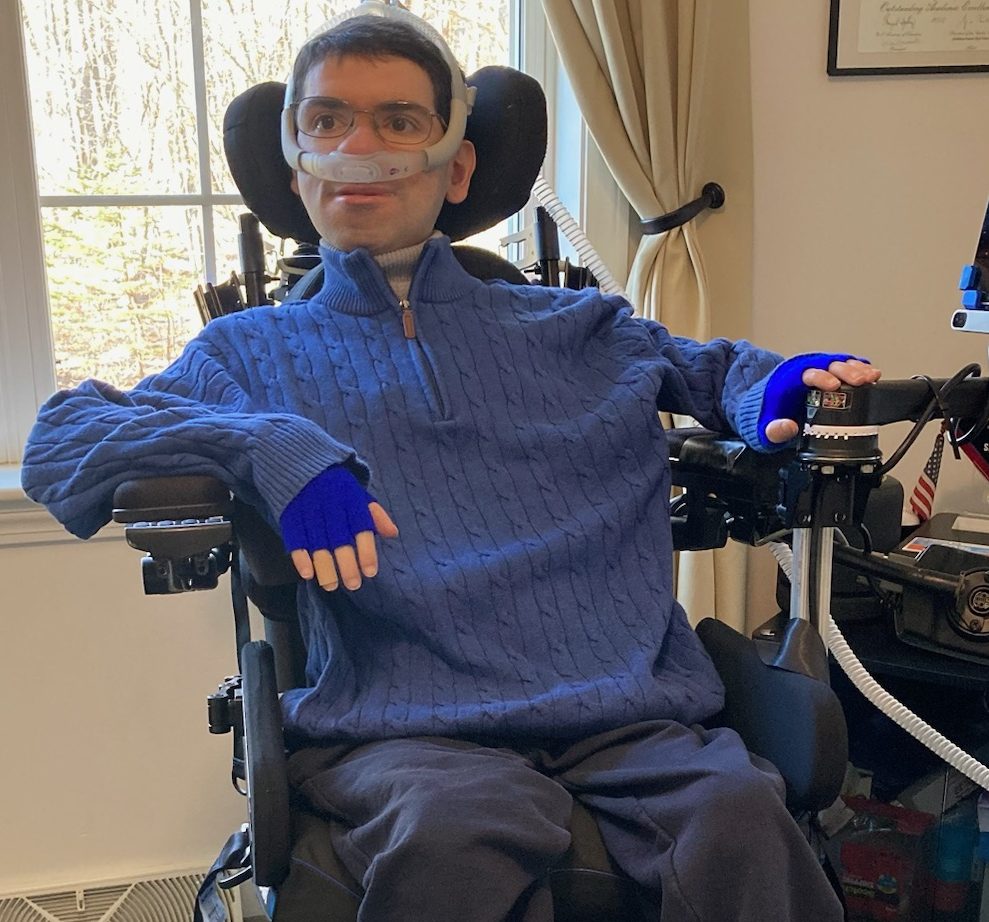The story of Sachin
My name is Sachin and I’m a 37-year-old guy who has a rare genetic disease known as Duchenne muscular dystrophy (DMD), which primarily affects males, with about 1 in 3500-5000 boys affected at birth globally. In some rare cases, it can affect females, too. DMD is a progressive muscle-wasting illness caused by a genetic mutation that prevents the human body from producing dystrophin. Dystrophin is a protein that is essential for the repair of wear and tear that our muscles sustain during contraction. Without dystrophin, muscles become weaker and damaged to the point that they can’t be repaired after injury. In the due course of time, DMD leads to loss of ambulation meaning inability to walk, having to use a wheelchair, and experiencing breathing and heart issues sometimes resulting in ventilator dependency with or without a tracheostomy. Lately, there have been some promising clinical trials of DMD treatments, but so far, there is no known cure.
Upon learning of my DMD diagnosis at age 5, my parents and I left my home country of India for the United States in hopes of a cure for this rare disease. I didn’t comprehend what was happening at the time, though I kept hearing the term “muscular dystrophy” a lot in my parents’ conversations. As I grew older, I noticed that I would get extremely tired after climbing a flight of stairs, I started tripping and falling more often after walking for some distance, for which I began using a walker for balance, and finally became a wheelchair user for life. This led me to understand DMD as being the reason for my physical deterioration. Years later, I had to use a ventilator and lost the ability to drive my motorized wheelchair independently. Though my struggles made me feel upset, my parents encouraged me to never lose hope or to give up even under these difficult circumstances, they said that what matters is what’s above my legs and arms: my strong mind and loving heart, and most importantly, they told me that I should focus on the things I’m able to do rather than what I’m not.
This last bit of advice from my parents made a profound impression on me, and to this day, I continue to live resiliently by it. In high school, I found my strongest subject to be math since it involved less physical hands-on activity and more analytical thinking and problem-solving skills. In college, where my mom played the role of my aide, notetaker, accessible van driver, and wheelchair controller, I pursued math as my undergraduate major. Years later, I received my graduate Master of Arts degree in math, followed by a Ph.D. in math virtually through Zoom at the height of the COVID-19 pandemic. I’m now an online adjunct instructor of math, teaching classes remotely from home. I’m also a published author of a few math articles in various peer-reviewed journals, and currently working on a manuscript for another, with continued guidance from my Ph.D. advisor even after completing my dissertation under him. My focus on my academic career in math is one of the things that keeps me going even with the physical challenges I face daily.
I currently live at home with my parents as my primary caregivers, my brother Sumit, and our dog Marco. I love them dearly, as they have always been a pillar of strength and fortitude for me and a reason for me to keep carrying on despite the adversity from DMD.
I mentioned math and my family as the things that keep me going. It’s true, but there’s more! I’m also grateful and highly appreciative of the small circle of friends I have in-person and online, the various DMD and disability-related support and advocacy groups I’ve made connections with over the years, my doctors and the medical professionals involved in my well-being, and my new motorized wheelchair with eye gaze tracking technology that has dramatically improved my independence of mobility and communication. In addition to this, I have several hobbies that keep me going. Some of these include reading, listening to music, watching movies and shows, going on family road trips, online shopping, and occasionally playing computer games on my laptop and tablet PCs.
I continue to hope for a cure for DMD. The current clinical trials for treatment, primarily involving boys with DMD who can still walk, certainly seem promising. Maybe someday in the future, men living with DMD, such as myself, will also get treated and potentially cured of this debilitating rare disease. If not, I’d love to at least see the younger and future generations affected by DMD be cured of it.
